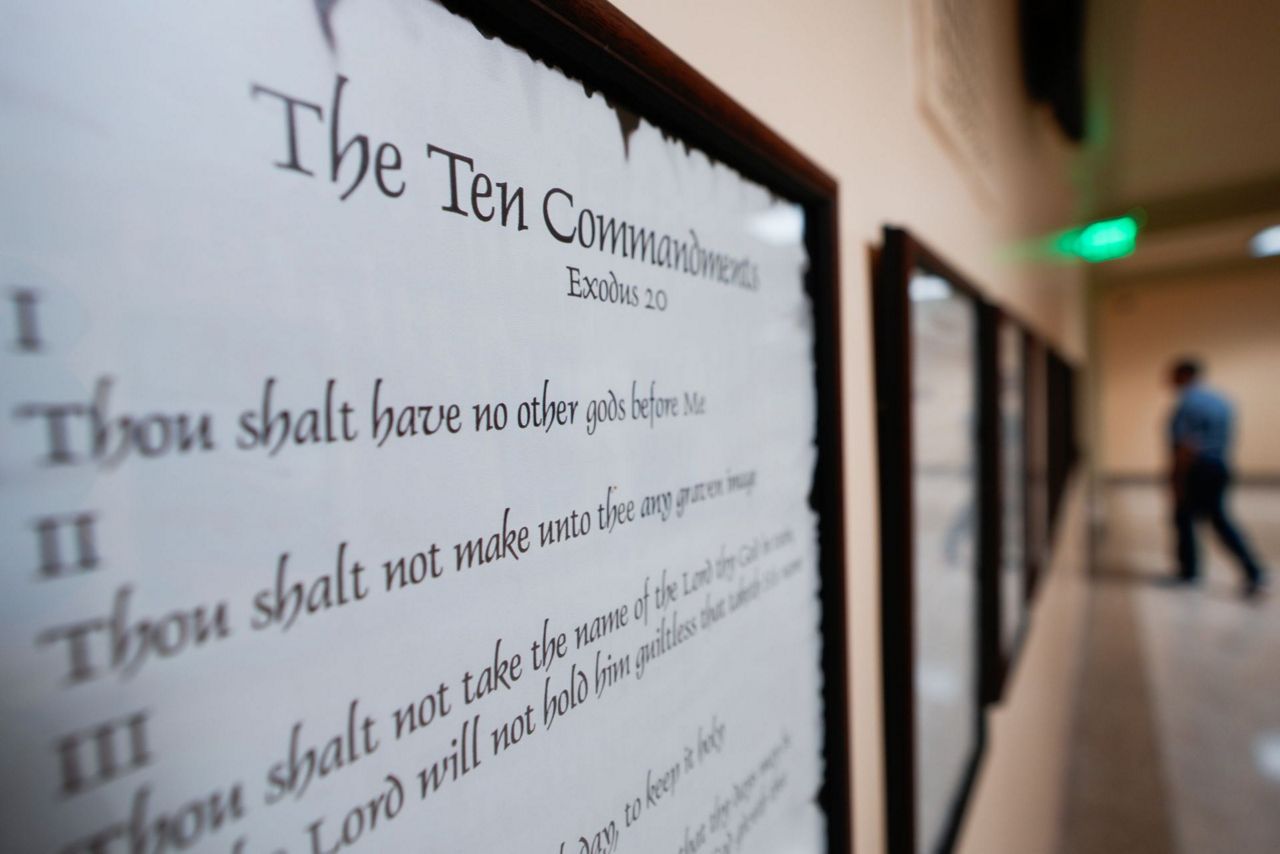BATON ROUGE, La. (AP) — Civil liberties groups filed a lawsuit Monday to block Louisiana’s new law that requires the Ten Commandments to be displayed in every public school classroom, a measure they contend is unconstitutional.
Opponents of the legislation signed into law by Republican Gov. Jeff Landry last week had long warned of an impending lawsuit. Plaintiffs in the suit include parents of Louisiana public school children, represented by attorneys with the American Civil Liberties Union, Americans United for Separation of Church and State, and the Freedom From Religion Foundation.
The lawsuit seeks a court declaration that the new law, referred to in the lawsuit as HB 71, violates First Amendment clauses forbidding government establishment of religion and guaranteeing religious liberty. It also seeks an order prohibiting the posting of the Ten Commandments in public school classrooms.
“The state’s main interest in passing H.B. 71 was to impose religious beliefs on public-school children, regardless of the harm to students and families,” the lawsuit says. "The law’s primary sponsor and author, Representative Dodie Horton, proclaimed during debate over the bill that it 'seeks to have a display of God’s law in the classroom for children to see what He says is right and what He says is wrong.'"
Defendants include state Superintendent of Education Cade Brumley, members of the state education board and some local school boards.
Under the new law, all public K-12 classrooms and state-funded universities will be required to display a poster-sized version of the Ten Commandments in “large, easily readable font" next year.
Opponents argue that the law is a violation of separation of church and state and that the display will isolate students, especially those who are not Christian. Proponents say the measure is not solely religious, but that it has historical significance. In the language of the law, the Ten Commandments are “foundational documents of our state and national government.”
The Ten Commandments has long been at the center of lawsuits across the nation.
In 1980, the U.S. Supreme Court ruled that a similar Kentucky law violated the establishment clause of the U.S. Constitution, which says Congress can “make no law respecting an establishment of religion.” The high court found that the law had no secular purpose but rather served a plainly religious purpose.
In a more recent ruling, the Supreme Court held in 2005 that such displays in a pair of Kentucky courthouses violated the Constitution. At the same time, the court upheld a Ten Commandments marker on the grounds of the Texas state Capitol in Austin. Those were 5-4 decisions, but the court’s makeup has changed, with a 6-3 conservative majority now.
Other states, including Texas, Oklahoma and Utah, have attempted to pass requirements that the schools display the Ten Commandments. However, with threats of legal battles, none has the mandate in place except for Louisiana.
The posters in Louisiana, which will be paired with a four-paragraph “context statement” describing how the Ten Commandments “were a prominent part of public education for almost three centuries,” must be in place in classrooms by the start of 2025. Under the law, state funds will not be used to implement the mandate. The posters would be paid for through donations.
The controversial law, in a state ensconced in the Bible Belt, comes during a new era of conservative leadership in Louisiana under Landry, who replaced two-term Democratic Gov. John Bel Edwards in January. The GOP holds a supermajority in the Legislature, and Republicans hold every statewide elected position, paving the way for lawmakers to push through a conservative agenda.
___
McGill reported from New Orleans.
___
This story has been corrected to show that the plaintiffs are represented by lawyers for the American Civil Liberties Union, Americans United for Separation of Church and State, and the Freedom From Religion Foundation
Copyright 2024 The Associated Press. All rights reserved. This material may not be published, broadcast, rewritten or redistributed without permission.



